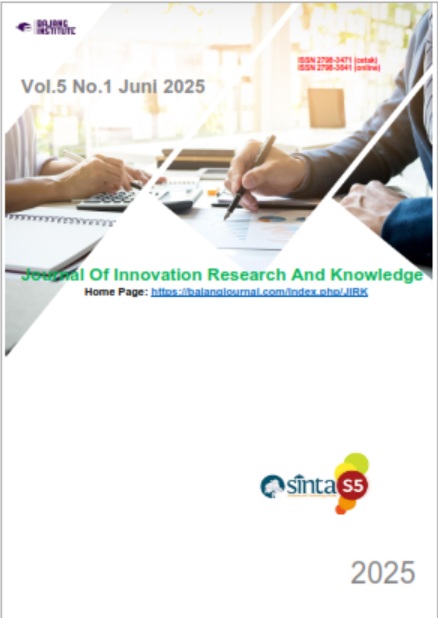DOES INTERNAL CONTROL CAPACITY AND DISCLOSURE OF FINANCIAL PERFORMANCE ON INSTAGRAM CAN INFLUENCE AUDIT OPINION? (STUDY CAPITAL MARKET IN CENTRAL ASIA)
Keywords:
Internal Control Capacity, Financial Performance Disclosure, Instagram, Audit Opinion, Central Asia Capital MarketsAbstract
This study investigates whether internal control capacity and the disclosure of financial performance on Instagram influence audit opinions in companies listed on the Central Asian capital markets. Using a descriptive quantitative approach, data were collected from 21 finance sector companies in Uzbekistan and Kazakhstan, and secondary data were collected from official capital market websites. The results show that both Instagram financial disclosures and total assets do not have a statistically significant effect on audit opinions. The findings suggest that traditional financial strength measures and social media disclosures might not yet play an important role in affecting auditors' judgments in the setting of Central Asia. Limitations of the study are the small sample size and limited data availability, indicating the potential for further research with a broader sample from more sectors and countries. The research contributes to the growing discussion of the evolving role of digital financial communication and internal controls on audit practice in emerging markets.
References
Apandi, R. N. N., Sofia, A., & Zulhaimi, H. (2022, July). Good Audit Planning Practices in the Digital Era. In 6th Global Conference on Business, Management, and Entrepreneurship (GCBME 2021) (pp. 72-80). Atlantis Press.
White & Case LLP. (2022). Global IPOs reached new highs. https://www.whitecase.com/insight-our-thinking/global-ipos-reached-new-highs
International Monetary Fund. (2024). Republic of Kazakhstan: Financial Sector Assessment Program—Technical Note on Astana International Financial Centre. https://www.imf.org/en/Publications/CR/Issues/2024/10/17/Republic-of-Kazakhstan-Financial-Sector-Assessment-Program-Technical-Note-on-Astana-556457
Makhlouf, M. H. S., Soda, M. Z., Oroud, Y., & Ramadan, A. H. (2022). The moderating effect of audit quality on the relationship between information asymmetry and earnings management: Evidence from Jordan. Afro-Asian Journal of Finance and Accounting, 12(2), 165–177. https://doi.org/10.1504/AAJFA.2022.123089
Primadita, I., Fitriany, F., & Kiantara, R. F. (2021). The effect of audit tenure on information asymmetry: Investigating the role of auditors in achieving a more transparent organization. IOP Conference Series: Earth and Environmental Science, 716, 012115. https://doi.org/10.1088/1755-1315/716/1/012115
Kharuddin, K. A. M., Zhu, W., & Al-Farooque, O. (2023). Internal control weakness, remediation failure, and audit opinions: Evidence from the US listed firms. Review of Economics and Finance, 21, 1628–1637. https://doi.org/10.55365/1923.x2023.21.178
López, D. M., Rich, K. T., & Smith, P. C. (2013). Auditor size and internal control reporting differences in nonprofit healthcare organizations. Journal of Public Budgeting, Accounting & Financial Management, 25(1), 41–68. https://doi.org/10.1108/JPBAFM-25-01-2013-B003
Beekes, W., Brown, P., & Zhang, Q. (2015). Corporate governance and the informativeness of disclosures in Australia: A re-examination. Accounting & Finance, 55(4), 931–963. https://doi.org/10.1111/acfi.12088
Kumar, P. (2024). The impact of executives' compensation and corporate governance attributes on voluntary disclosures: Does audit quality matter? Journal of Applied Accounting Research, 25(2), 240–263. https://doi.org/10.1108/JAAR-11-2022-0302
ICAEW. (2023). Understanding audit reports. Retrieved from https://www.icaew.com/technical/audit-and-assurance/audit/reporting-and-completion/understanding-audit-reports
PCAOB. (2023). AS 3105: Departures from unqualified opinions and other reporting circumstances. Retrieved from https://pcaobus.org/oversight/standards/auditing-standards/details/AS3105
Luo, X., Zhang, J., & Duan, W. (2020). Social media and firm equity value. Information Systems Research, 31(1), 200–217. https://doi.org/10.1287/isre.2019.0895
Sun, J., Lan, G., & Liu, G. (2021). Internal control quality, asset structure, and audit opinions. Journal of International Accounting Research, 20(2), 115–134. https://doi.org/10.2308/JIAR-2020-060
OECD. (2022). Capital Markets in Eurasia: Financial Sector Development and Regional Integration. https://doi.org/10.1787/9789264313955-en
World Bank. (2023). Financial Sector Assessment for Central Asia. https://doi.org/10.1596/978-1-4648-1691-1
Hair, J. F., Black, W. C., Babin, B. J., & Anderson, R. E. (2019). Multivariate Data Analysis (8th ed.). Cengage Learning.
Ainin, S., Parveen, F., Moghavvemi, S., Jaafar, N. I., & Mohd Shuib, N. L. (2020). Factors influencing the use of social media by SMEs and its performance outcomes. Industrial Management & Data Systems, 120(1), 117–136. https://doi.org/10.1108/IMDS-07-2019-0378
Kulikova, O., & Sirotkina, N. (2020). Transparency and corporate governance in Central Asia: Challenges and progress. Central Asian Economic Review, 2(4), 34–48.
ACCA. (n.d.). Forming an audit opinion. Retrieved from https://www.accaglobal.com/us/en/student/exam-support-resources/fundamentals-exams-study-resources/f8/technical-















